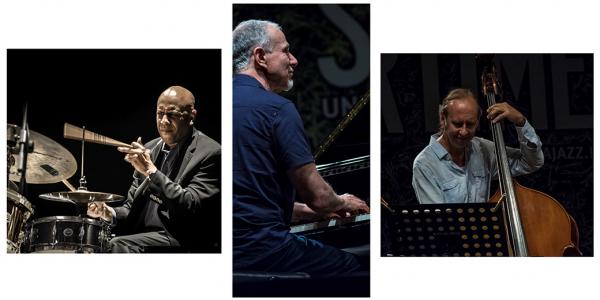Marc Copland Trio with Drew Gress & Billy Drummond
Program:
Tickets
$20 General
$15 Wash U fac/staff
$10 Students
Edison Box Office - 314-935-6543
The Marc Copland Trio with bassist Drew Gress and drummer Billy Drummond return to present a concert of Copland’s lyrical and adventurous music. Copland became part of the jazz scene in Philadelphia in the early 1960s as a saxophonist, and later moved to New York City, where he experimented with electric alto saxophone. In the early 1970s, while pursuing his own harmonic concept, he grew dissatisfied with what he felt were inherent limitations in the saxophone and moved to the Baltimore-Washington D.C. area, where he remained for a decade to retrain as a jazz pianist. He returned to New York in the mid-1980s.
Copland was born on May 27, 1948 in Philadelphia, Pennsylvania. He began taking piano lessons at age seven, but stopped abruptly at the age of ten when his public school offered the option of saxophone training. Beginning his career on alto sax, Copland became part of a vibrant music scene in his hometown in the early 1960s, learning and playing with Michael Brecker, a close friend and fellow high school student. In 1965 he briefly studied harmony with Romeo Cascarino in Philadelphia and also began training in composition with Meyer Kupferman and studied saxophone with Joseph Allard, both in New York.
In 1966, Copland moved to New York City, where he attended Columbia University. He became part of a late 1960s and early 1970s New York jazz scene that expanded from the traditional clubs into lofts around the city. During this period, Copland was, along with John Abercrombie and Glen Moore, a member of the Chico Hamilton Quartet. He experimented by adding electronic processors to his alto, culminating in the recording of Friends, an electric jazz album produced by a small New York City start-up label, Oblivion. This album, with Abercrombie, Clint Houston, and Jeff Williams, achieved a kind of cult status, earning a five-star review in Down Beat magazine.
Increasingly, however, Copland was writing music with more complex chords that suggested to him an approach to music very different from his acoustic and electronic saxophone work. He came to feel that as an instrument, the saxophone was not a suitable vehicle to fully express his musical imagination. By 1973, he had decided to switch to piano.
For the next decade, Copland labored in Washington, D.C. and Baltimore in relative obscurity while mastering his new instrument. During this period he underwent a kind of apprenticeship, playing with well-known musicians passing through the area who asked for him as an accompanist. Backing up different musicians one week to the next, he worked with artists such as Randy Brecker, Bob Berg, Hank Crawford, Art Farmer, Curtis Fuller, Tom Harrell, Eddie Harris, Harold Land and Blue Mitchell, Dave Liebman, Bob Mintzer, Gary Peacock, and Sonny Stitt. During this time he also led his own bands in local clubs, playing with many of the musicians who lived and worked in the area. One of these, bassist Drew Gress, later moved to New York and over the years has become one of Copland’s chief musical collaborators.
In the early 1980s, Copland returned to New York. For a time he returned weekly to Washington to continue private teaching and a steady trio engagement, but after a couple of years these regular visits tapered off in favor of more extensive work in New York City. During this period he worked with Bob Belden, Jane Ira Bloom, Joe Lovano, Herbie Mann, James Moody (with whom he toured for three years), John Scofield, Jim Snidero, and Dave Stryker. A busy sideman, he began to appear with his own bands in local clubs, but remained unrecorded as a leader. Acting on a tip that the Japanese label Jazz City was searching for ten American pianists, Copland sent an audition tape to guitarist/producer Yoshiake Masuo. After listening, the producer called Copland to decline, saying that the label had already reached agreement with ten pianists. A few weeks later Masuo called back to say one pianist had dropped out, and offered Copland his first record deal. My Foolish Heart, Copland’s debut disc as leader, was recorded at “The Studio” in Soho. His trio and quartet gigs grew more frequent, and as word of his trio spread, he began to play regularly at several venues around the States, first with Peacock and drummer Bill Stewart, establishing himself as a leading pianist in modern jazz.
Photo credit: Marc Lamonte
Health and Safety Requirements - 560 Music Center
(Please review full details for the Health & Safety Requirements by clicking here.)
• Prior to coming to campus, all guests are required to complete the visitor self-screening (https://covid19.wustl.edu/health-safety/daily-self-screening/)
• Guests ages 12 and older are required to show proof of full COVID-19 vaccination or a negative COVID-19 test. All guests must also show a photo ID for entry.
• All guests must wear a face mask.

